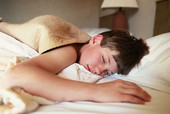- Could You Spot the Silent Symptoms of Stress?
- Gas Stoves Could Leave Your Lungs Vulnerable to Nitrogen Dioxide
- Key Therapy Equally Effective for Women, Men With Narrowed Leg Arteries
- Doctors Describe Texas Dairy Farm Worker’s Case of Bird Flu
- Does Preschool Boost Kids’ Long-Term Academic Success? Study Finds Mixed Results
- AI Might Spot Rare Diseases in Patients Years Earlier
- An Orangutan Healed Himself With Medicinal Plant
- Quit-Smoking Meds Not Working for You? Try Upping the Dose
- Fewer Americans Are Suffering Most Dangerous Form of Heart Attack
- Even Skipping Meat for One Meal Helps Liver Disease Patients
Getting Back to School Sleep Schedules


As the new school year begins, parents need to get their children and teens back on their normal sleep routines, an expert says.
Try to prevent your children from taking naps until they’ve adjusted to their earlier sleep and wake schedule. This will help them fall asleep more easily and sleep better through the night, Dr. Sanjeev Kothare, director of NYU Langone Medical Center’s Pediatric Sleep Disorders Program, advised.
It’s also a good idea to limit youngster’s caffeine consumption in the afternoon, especially after 3 p.m., Kothare said. He noted that caffeine can stay in the body for eight to 10 hours.
Limit your children’s use of electronic devices a few hours before bedtime. The blue light emitted by televisions, computer screens, smartphones and video games keeps brain activity high, which can make it difficult to fall asleep.
Unwinding before bed will help put youngsters in a relaxed mood. Get them to read a book, lie in bed, dim the lights and relax an hour before bed, Kothare suggested.
Try to keep children’s weekend sleep schedules close to their weekday routines. Getting too far off track will make it more difficult for them to fall asleep on Sunday night, resulting in a disturbed sleep cycle.
More information
The American Academy of Pediatrics has more about preparing for a new school year.
Source: HealthDay
Copyright © 2024 HealthDay. All rights reserved.










